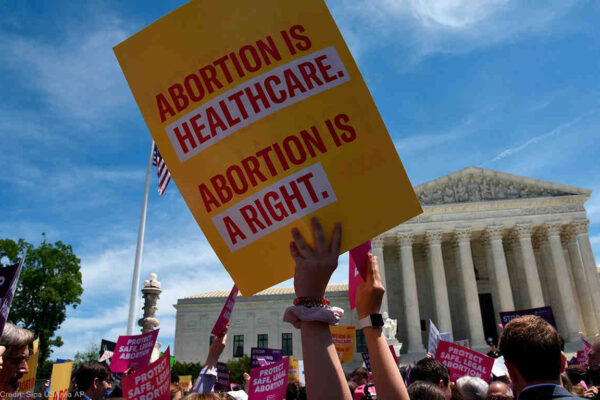HOUSTON — The Supreme Court issued a shameful ruling today overturning Roe v. Wade — the landmark decision recognizing the constitutional right to abortion nearly 50 years ago.
While abortion is still legal today in Texas, politicians have passed what is known as a trigger ban: A law from 2021 that bans abortion after Roe v. Wade is overturned by the Supreme Court. That “trigger” will go into effect in the upcoming weeks, ending abortion access as we know it in the state.
In addition, the ruling in this case, Dobbs v. Jackson Women’s Health Organization, will set off a chain reaction with states banning abortion and criminalizing essential care throughout entire regions of the country.
This decision is an unprecedented attack on abortion rights and reproductive freedom. Half the states in the country are expected to ban abortion, denying 36 million people the fundamental right to decide for themselves whether and when to become a parent. That includes almost 6 million people in Texas.
The ACLU of Texas is working with partners and providers to respond to this ruling and fight back.
The follow quote can be attributed to Oni Blair, executive director of the ACLU of Texas:
“We are outraged and heartbroken that the Supreme Court has overturned 50 years of precedent to ban abortion. Texans will feel the consequences of this deadly decision soon due to a trigger law expected to go into effect in the months to come— creating a total abortion ban that will make forced pregnancy the law of the land.The new reality is unacceptable, and we know it will fall hardest on people of color in Texas who already face racial disparities in healthcare, especially Black mothers. We will hold politicians accountable in courthouses and statehouses, at the ballot box, and through protests in the streets. The ACLU of Texas will keep fighting for the reproductive freedom that we all deserve.”
As some Texas residents have already experienced due to severe obstacles to abortion care, banning abortion leaves many with no other option than to carry a pregnancy to term and give birth. Forcing someone to carry a pregnancy against their will has life-altering consequences, including enduring serious health risks from continued pregnancy and childbirth, making it harder to escape poverty, derailing their education and career plans, and making it more difficult to leave an abusive partner.
Today’s ruling will also have deadly consequences, with the harm falling hardest on Black women and other people of color who already face a severe maternal mortality crisis that is the worst in the same states that are determined to ban abortion. In fact, Black women are three times more likely than white women to die during childbirth, or shortly after. If abortion is banned nationwide, pregnancy-related deaths are estimated to increase by 21 percent nationwide, and 33 percent among Black women. Texas has one of the most concerning maternal mortality rates in the country, estimated at 14.6 per 100,000 live births. For black women, it's even worse: 27.8 per 100,000.
Banning abortion will have an immediate and devastating impact on women and all people who can become pregnant, taking from them a right that has been central to their ability to plan their lives, families, and careers. But the burdens will disproportionately fall on women, communities of color, those struggling to make ends meet, young people, rural residents, undocumented immigrants, and the LGBTQ+ communities. This opinion will also lead to pregnancy losses being subject to suspicion, investigation, and arrest, and patients and doctors facing charges and jail.
Anti-abortion politicians have put Texas on the wrong side of history for too long, and the ACLU is determined to not to let them off the hook. The ACLU of Texas is joining partners in mobilizing supporters to make sure that these anti-abortion politicians feel the consequences of their brazen disregard for our rights. Politicians who do not believe in protecting the civil rights and liberties of their constituents have no business in governors’ mansions, in state attorneys general’s offices, on state supreme court benches, or in state legislatures. We will be here to hold them to account.
Stay Informed
Sign up to be the first to hear about how to take action.
By completing this form, I agree to receive occasional emails per the terms of the ACLU’s privacy statement.
By completing this form, I agree to receive occasional emails per the terms of the ACLU’s privacy statement.

